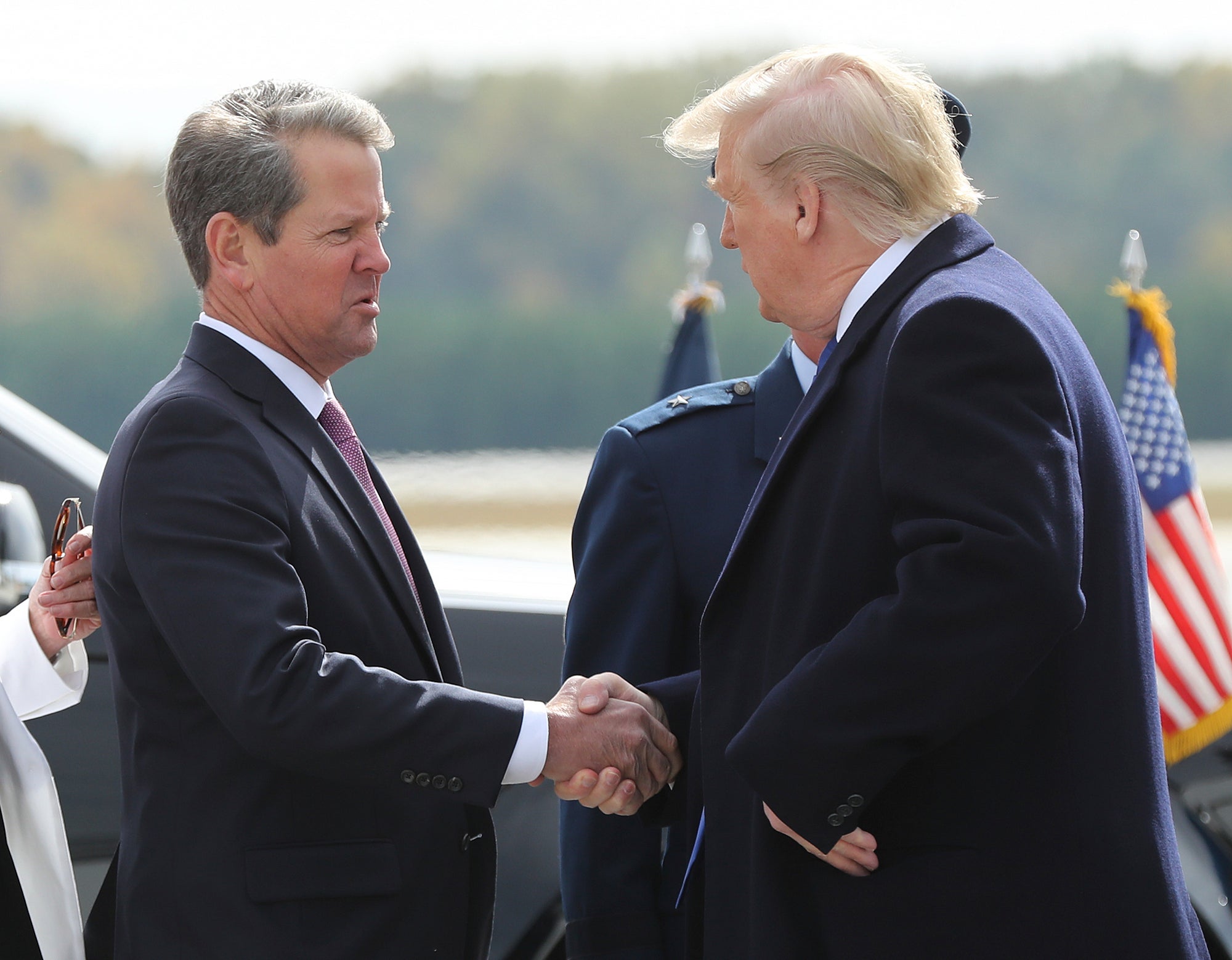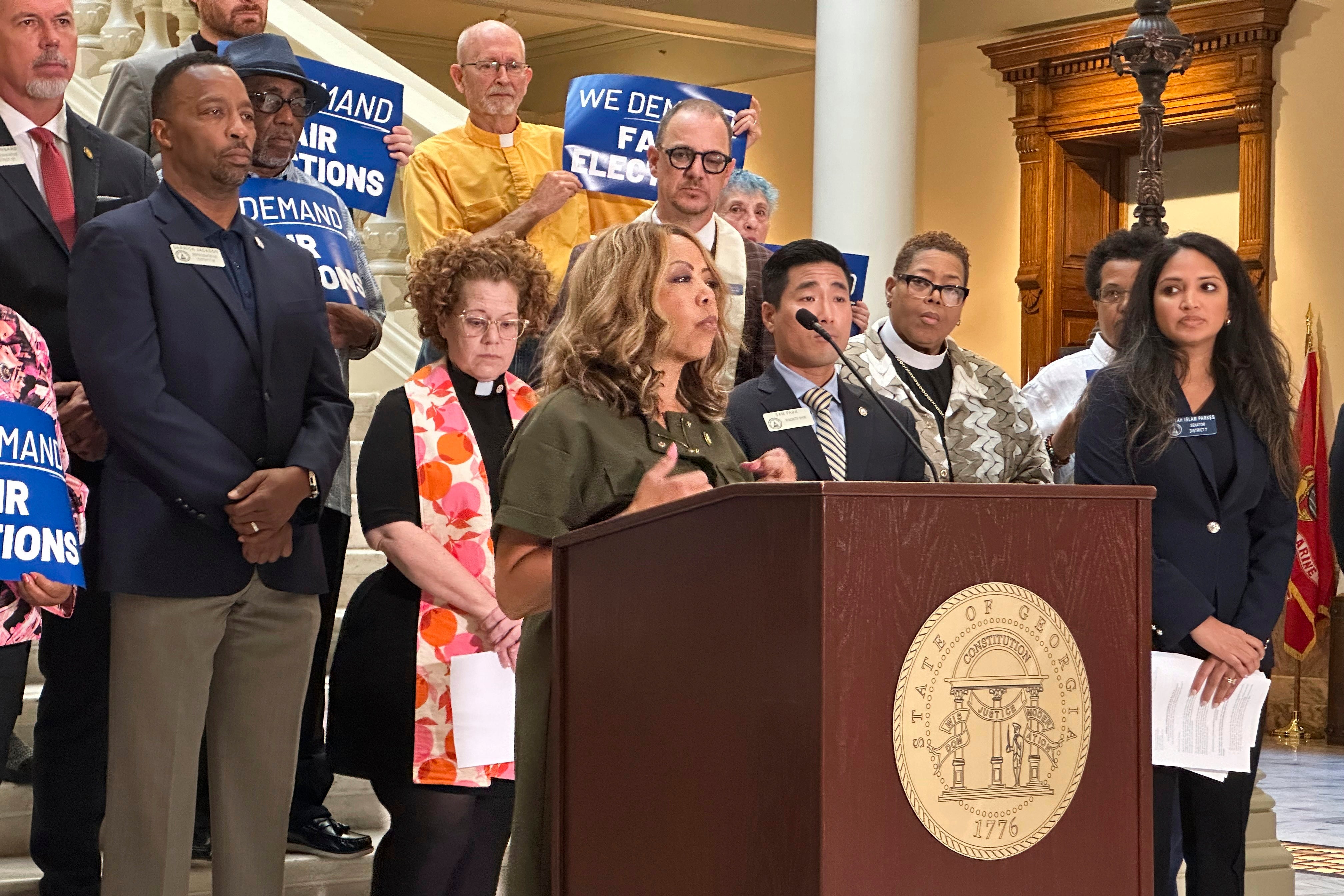How Georgia’s pro-Trump election board could help him steal an election
Democrats are suing over Georgia’s Republican ‘power grab’ while 2020’s election denialism continues to fuel threats to vote certification across the country, Alex Woodward reports


Your support helps us to tell the story
From reproductive rights to climate change to Big Tech, The Independent is on the ground when the story is developing. Whether it's investigating the financials of Elon Musk's pro-Trump PAC or producing our latest documentary, 'The A Word', which shines a light on the American women fighting for reproductive rights, we know how important it is to parse out the facts from the messaging.
At such a critical moment in US history, we need reporters on the ground. Your donation allows us to keep sending journalists to speak to both sides of the story.
The Independent is trusted by Americans across the entire political spectrum. And unlike many other quality news outlets, we choose not to lock Americans out of our reporting and analysis with paywalls. We believe quality journalism should be available to everyone, paid for by those who can afford it.
Your support makes all the difference.At a rally in Georgia days before a crucial vote at the state’s election board, Donald Trump praised three of the board’s five members as “pit bulls fighting for victory.”
“I don’t know if you’ve heard, but the Georgia State Election Board is in a very positive way,” Trump said in Atlanta on August 3. “They’re on fire. They’re doing a great job.”
Those members — Rick Jeffares, Janelle King and Janice Johnston — ultimately voted for sweeping rule changes to how counties can certify election rules in a state that the former president lost by narrow margins in 2020, and where he is now criminally charged for his attempts to reverse that loss.
Election analysts predict the state could come down to even smaller vote margins in November, potentially inviting challenges from Trump-allied groups to do what Trump couldn’t in 2020, thanks to new, potentially illegal rules that could invite partisan investigations. The Democratic Party and a group of Georgia Democrats — with the support of Kamala Harris’s campaign — are now suing over the changes.
“Everyone who cares about American democracy and who wants to make sure their vote counts should be alarmed,” Georgia Democratic Representative Sam Park told The Independent.
With the first days of early voting approaching, “there’s a lot of cause for alarm,” according to Park, and there’s “a lot of fear and concern” among voters in his district who are worried about what happens to their ballots after they cast their votes.
Election workers are under an “incredible amount of undue pressure” from voter suppression threats, Park explained, and the “brazen effort in which unelected partisans have taken over the local elections boards, where elected leaders have conceded to their base, to the far right, in continuing to base changes on fear and conspiracy theories.”

The pro-Trump majority on Georgia’s election board has drawn national scrutiny for a rule that allows county boards to make “reasonable inquiries” before certifying election results.
But the rule does not define what a “reasonable inquiry” is, nor does it place any limits on how long an inquiry can last, or what documents members can demand (and then take home with them), before reconvening to certify — or reject — the results. There are 159 counties in the state, so there could end up being 159 ways that county boards interpret the changes.
The rules, critics warn, effectively bake into a clerical certification process what Trump and his allies tried to do with their spurious efforts to challenge election results in 2020.
Next month, the board will take up another rule that would require counties to perform hand recounts of ballots at the local precinct level, on election night, which opponents fear could compromise ballot integrity and open a window for legal challenges from pro-Trump groups to cast doubt on results.
“Our State Election Board exists to protect the right to vote for all Georgians, not to favor any single candidate in any election,” Georgia congresswoman and state party chair Nikema Williams said in a statement shared with The Independent.
The board is “determined to establish a new power of not certifying an election result should their preferred candidate lose — as he did in 2020,” she added. “That’s why we’re fighting back, and we will beat them in court like we will beat them at the ballot box this fall.”
State-level changes to election administration in the wake of 2020’s election denialism are a “democracy catastrophe and an ethics disaster,” according to legal scholars Norm Eisen and Richard Painter.
Right-wing legal groups across the country are endorsing proposed legislation and launching legal battles to try to assert authority over certification processes, underscoring how far the former president’s allies will go, down to the local level, to contest the results of an election he could lose.
After championing “election integrity” with discredited claims of voter fraud, some Republicans are now seeing the certification of elections as a discretionary act, not as a ministerial or clerical responsibility to voters.
More than 30 officials in eight states who refused to certify 2020 results are set to return to their positions to potentially do it again in 2024, according to a report from democracy watchdog group Citizens for Responsibility and Ethics in Washington.
An empowered elections board in Georgia has a “very direct tie to all the disinformation and voter suppression and attempted overturning of election results” after state lawmakers approved a sweeping elections law in 2021, according to Lauren Groh-Wargo, CEO of voting rights organization Fair Fight.
The rules changes have “set the table to successfully do what they failed to do last time,” she told reporters this week, and “weaponize” the certification process to get the results they wanted.
“Certification is a clerical process that should not be interfered with,” she said.
Quintin Fulks, deputy campaign manager for the Harris campaign insisted that “a few unelected extremists can’t just decide not to count your vote.”
“Certifying an election is not a choice, it’s the law,” he said.

Emails obtained by Rolling Stone and American Doom also appear to show a pro-Trump member of the state board working with the former president’s allies and election-denying county-level board members from across the state, months before the rule changes, to advance unsubstantiated claims of fraud.
It’s all a reflection of just how deeply embedded the false notion of a “stolen election” has become among Republicans, according to Andra Gillespie, a political science professor at Georgia’s Emory University.
“Do you really want people who are sympathetic to the idea of the 2020 election being stolen in a position of power, where they can delay their own certification?” Gillespie told The Independent. “Is that the right type of structure you want to set up?”
Politically appointed board members, borne out of the same election denialism miasma as the officials who put them in power, “are ramping this up with the MAGA disinformation goal in mind after the election,” according to Groh-Wargo said.
“Courts are ultimately going to do the right thing, but the delay and confusion is going to have real consequences,” she said.

Georgia’s Republican Secretary of State Brad Raffensperger — famously on the receiving end of Trump’s call to “find” enough votes to win the state in 2020 — has also criticized the election board’s certification rules, and that the board’s three Trump-allied members Johnston, King, and Jeffares have engaged in “activist rule-making” that would “undermine voter confidence and burden election workers.”
Governor Brian Kemp has also asked state attorney general Chris Carr to determine whether he has authority over ethics complaints directed at the board.
But the board is now entertaining a “barrage of craziness” from activist groups that “don’t have anything to do with what’s before them for certifying an election,” according to Cathy Woolard, a former chair of Fulton County’s elections board.
“This really goes to the heart of the election process,” according to Georgia attorney Allegra Lawrence Hardy. “It seems almost impossible that we won’t have at some point this weighed in on at the federal courts and the Supreme Court.”
This story was first published on September 2.
Join our commenting forum
Join thought-provoking conversations, follow other Independent readers and see their replies
Comments